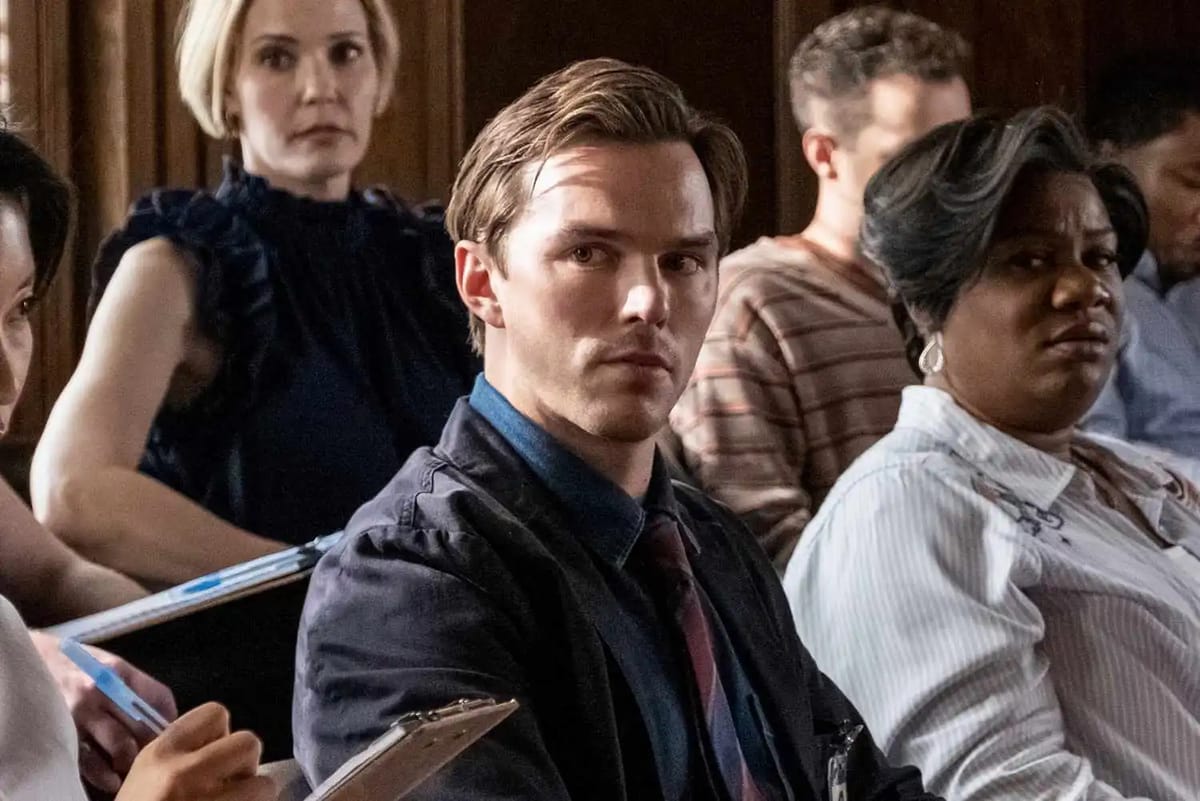
The first 40 minutes of last year’s courtroom drama Juror #2, written by Jonathan Abrams and directed by Clint Eastwood, establish an intriguing premise: our main character Justin is an ordinary man with a pregnant wife who is selected to the jury of a high-profile murder trial. But as the trial begins, he quickly realizes that the defendant is innocent, and that he is in fact the one responsible for the victim’s death, having accidentally run her over in a heavy rainstorm, thinking at the time that he had hit a deer. At the film’s 38-minute mark, the jury deliberation begins with Justin facing a serious moral dilemma. The scene that follows, though, swings the film into much muddier territory, as it becomes an almost beat-for-beat quotation of the first 15 minutes of 12 Angry Men.
After the jurors mill about the deliberation room, the first point of business brought up by the foreperson is whether they should discuss the case first and then cast their votes, or vote right away to see where they stand. The general agreement is to vote right away, with one juror hoping that they can go home immediately if they all agree. In the initial vote, a handful of jurors immediately proclaim the defendant guilty and the others follow suit until there is only one juror left. In Juror #2 this is Justin, in 12 Angry Men it is Juror #8. The other jurors ask what his issue with the case is and he responds that he doesn’t have any specific reason for voting not guilty, he just wants the jury to discuss the case. Another juror is visibly frustrated by this and complains that he is just trying to waste their time. The holdout juror defends his vote by pointing out that they’re dealing with a man’s life here – in Juror #2 the defendant faces life in prison and in 12 Angry Men a guilty verdict in this case guarantees a death sentence – and that they at least owe the defendant the courtesy of talking the case over. So the members of the jury agree to discuss the case, some very begrudgingly, and from there the holdout juror beings swaying others to his side.
The parallels do not stop there. Many of the jurors in Juror #2 are clear matches for the jurors in 12 Angry Men. Justin is Juror #8, the lone holdout in the initial vote who becomes the leader of the not guilty contingent. The character Marcus is Juror #3, the aggressive leader of the guilty contingent whose personal life, we come to learn, has given him a deep hatred of the defendant. Yolanda acts as Juror #7, whose sole concern is getting out of jury duty as quickly as possible and who becomes frustrated with Justin for extending the deliberations. The stoner dude Brody is Juror #12, who has no opinion or critical thinking skills of his own, goes along with what everybody else says, and does not take the case seriously. And if the mere analogy of roles amidst the jury were not a close enough parallel, Juror #2 also has all these characters sit at roughly the same spots at the table as their counterparts from 12 Angry Men.
The quotation of 12 Angry Men in Juror #2 is extensive, and ultimately against the film’s better interests. There is a fine line between homage and retread, between putting your work in conversation with another and just copying it. Juror #2 strays a good distance into the latter category, and this duplication of 12 Angry Men’s scenario hinders its ability to explore its own themes.
To begin with, such a thorough quotation is unnecessary. 12 Angry Men is the god emperor of the jury deliberation story, and any film that belongs to that genre is inevitably going to draw comparisons to it, the same way every time loop movie gets compared to Groundhog Day and every dystopian novel gets compared to Nineteen Eighty-Four. There is no need for the film to go out of its way to remind us of 12 Angry Men; it would be a tougher task to ward off such comparisons. So when the film has a scene play out with the exact same beats as 12 Angry Men in the exact same order, it feels redundant and hackneyed.
More important, though, is the way that this choice is telling us to watch the film. Comparisons with 12 Angry Men were inevitable, but by drawing such a close analogy between the two films, Juror #2 tells us to really lean into the comparisons, that we ought to be thinking about everything that is happening in this film through the lens of our understanding of 12 Angry Men. But doing so muddies the film’s thematic web, because the story it is telling is not really an analogue to that of 12 Angry Men.
The most immediate comparison the film leads us to make is with Justin as Juror #8. The function of Juror #8 within 12 Angry Men is as a moral paragon. He is an ordinary man with no connection to the case, no reason to vote one way or the other. His decision to stand by his not guilty vote in the face of eleven jurors who disagree with him is a purely moral one. He just believes that talking the case over and giving the defendant fair consideration is the right thing to do. Justin’s situation, though, is more complicated. His not guilty vote is also a moral decision, but whereas Juror #8 has no personal considerations that might weigh his vote, Justin has significant self-interest in voting guilty. Doing so would close the case with him getting off scot-free for the manslaughter he committed. The further he pulls the jury towards the defendant Sythe’s innocence, the closer he brings them to discovering his own guilt. His not-guilty vote comes in spite of these considerations, from the stronger power of his conscience not wanting to condemn an innocent man to a life sentence. Another key difference is that where Juror #8 is not sure whether the defendant in his case is guilty – and indeed we never learn in 12 Angry Men the actual truth of the matter – Justin knows Sythe is innocent from the outset, and that makes his decision to argue for that innocence very different. 12 Angry Men is about one man operating from a place of moral principle chipping away at the biases that cloud the judgment of his peers. Juror #2 is about the struggle to find a moral choice amidst a host of relevant personal considerations. 12 Angry Men is about moral righteousness prevailing amidst adversity. Juror #2 is about a moral dilemma.
Of course, there is nothing wrong with Juror #2 telling such a story, but the trouble comes in leading us to think about that story as though it were one of a different kind. If we follow the film’s suggestion and think of Justin as Juror #8, as playing a role akin to a moral paragon, then the rest of the film becomes thematically confusing. If we are supposed to think of Justin as acting from a place of moral certainty, then it becomes difficult to account for his oscillation between his conscience-based attempts to demonstrate Sythe’s innocence and his self-interested attempts to cover his own tracks. If we’re supposed to see Justin as fighting against the biases of the other jurors, then what are we to make of the deliberation’s outcome, where Marcus tells Justin directly that nothing can get him to change his vote, and Justin responds by capitulating and changing his vote to guilty? Under the moral dilemma view, Justin is caving to the self-interested option when the path to the moral one becomes too steep, but from the moral righteousness view that the film unintentionally encourages, it seems like our righteous juror has just given up and the film is admitting that some biases cannot be overcome. The problem isn’t with the thematic consistency of these events themselves, it’s that the film is leading us to interpret them through a thematic schema in which they do not fit.
This post is for paying subscribers only
Subscribe now and have access to all our stories, enjoy exclusive content and stay up to date with constant updates.
Already a member? Sign in
